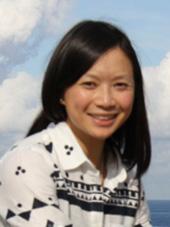-
About
- Departments & Offices
-
Academics
- Physician Assistant
- Special Master’s (MBS)
-
Admissions & Financial Aid
- Tuition & Fees
-
Student Experience
-
- Student Resources by Program
- Academic & Student Support
- Wellness & Wellbeing
- Student Life
- Events & Traditions
-
-
Research
- Research Labs & Centers
-
Local & Global Engagement
- Global Health Programs
- Community Engagement
Our Alumni: Angie Lee
"Students can also take advantage of cross-enrolling at Tufts consortium schools...The ability to cross-enroll provided an opportunity to expand my network beyond traditional public health professionals."

I work at Management Sciences for Health (MSH), an international health organization with more than 2500 staff who are active in over 70 countries worldwide. We build the capacity of health systems and leaders, managers and policy makers to deliver high-quality, accessible and equitable health services to their populations. I support the health financing portfolio and my work spans many geographic areas including sub-Saharan Africa, Southeast Asia and Latin America and the Caribbean. Recently I provided technical assistance to the Ministry of Health and Social Work in Liberia to scale up a nationwide system of performance-based financing at the primary healthcare level. MSH’s work in developing nations brings complex and often ambiguous challenges; it’s what motivates me to continue developing innovative and pragmatic solutions to improve healthcare systems in the developing world.
What inspired you to pursue an MPH?
As an undergraduate student at Tufts, one of my freshman classes was taught by Dr. Edith Balbach, a professor who would become a lifelong mentor. Her recommended readings became the literature I perused in my downtime, and soon public health frameworks and ideas dominated my thinking. I began to operate like a social scientist and abandoned my vision of pursuing medicine. Instead I bore full-steam ahead into a profession that I knew would have great impact on the healthcare of populations at scale. The game-changer for me was acknowledging that socioeconomic and cultural factors play as much a role in our health as regulatory healthcare policies and individual choices do. I knew I was interested in the big picture, and I wanted to pursue that in learning and practice.
What drew you to the Tufts Program?
The Tufts program offered courses that were multi-disciplinary in every sense of the word. Students can also take advantage of cross-enrolling at Tufts consortium schools. I took formative classes at Emerson College in Risk Communication, and at the Tufts Fletcher School of Law and Diplomacy in Micro-development Economics, Research Methods in Humanitarian Settings, and Humanitarian Studies in the Field. My classmates were lawyers, diplomats, nutritionists, and humanitarian assistance professionals. The ability to cross-enroll provided an opportunity to expand my network beyond traditional public health professionals. Additionally, the then nascent Global Health concentration offered flexibility in tailoring course and program requirements to align with my personal interests and career ambitions.
How did your Tufts degree help prepare you to work in the field?
My international placement in Uganda for my Applied Learning Experience (ALE) revealed many realities of working in international health settings. Troubleshooting in an unfamiliar environment with scarce resources, narrow political support, and in a time-limited manner taught me the critical skills necessary for an international health and development career. The most valuable and practical lessons I learned were the importance of being able to think on my feet, operate judiciously, maintain full integrity and preserve my sanity through humor! These important lessons continue to inform the way I do my work every day.
What advice do you have for prospective students?
Ask yourself what you want to be doing when you graduate, in five years, and in ten years. Talk with mentors, or others who have careers that you admire, and explore which paths may lead you to do the things you want to do. Think carefully and deliberately about which skills you want to develop. In the workforce, it’s no longer sufficient to have a graduate degree. Employers look for people with tangible skills. Know why you’re seeking a graduate degree, and what skills specific programs can impart. Research potential schools with that in mind and find the one that will give you the skills and network you need to make your dreams come true!